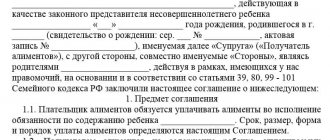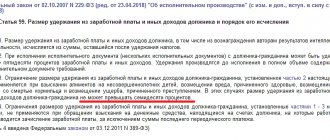Author of the article: Anastasia Ivanova Last modified: January 2020 14173
Calculating alimony as a percentage is the most common option for withholding money to provide for a child. The Family Code specifies the amount of payments; it depends on the number of children: from 25% to 50% of earnings. In some cases, the court may order alimony of 70 percent if there are grounds for this. Let's consider the circumstances under which the amount of financial assistance to a child will be increased.
Registration of alimony maintenance
In accordance with the law, there are 3 ways to formalize alimony obligations for the maintenance of minors:
- Signing an agreement to pay alimony. If the parents have agreed on the issue of living and financial support for the children, it is recommended to draw up an agreement. It can be issued through a notary. The text of the document defines the methodology for collecting alimony payments, their size and frequency. The agreement is signed at the notary office followed by notarization. Next, the document is submitted to the FSSP to open enforcement proceedings against the debtor and begin withholding alimony.
- Assignment of alimony maintenance by filing a claim in court. If the parents are unable to reach an agreement, then one of them (most often the mother) has to go to court. During the trial, the court will hear arguments and consider evidence from the parties, after which a decision will be made whether to grant or reject the claim.
- Obtaining a court order. If the father agrees to provide financial support to minors, but has not yet done so, then the mother only needs to write an application to the magistrate’s court for an order. It has the force of executive documentation. It should be handed over to the bailiffs to begin deducting the required amount of money from the father’s earnings.
Most often, child support for minors is established as a share of earnings or as a fixed amount. Moreover, the amount of financial support depends on the number of children. When using the share method, the amount of deduction will be as follows:
- for one child – 25%;
- for two children – 33%;
- three or more children – 50%.
The fixed amount of alimony depends on the cost of living in the region of residence. For example, 1 or 1.5 subsistence minimums can be assigned to one child. With more children, the amount increases proportionally.
Moreover, each child of a child support obligee has equal rights to receive financial support. The year of birth of the children does not matter. Alimony maintenance is assigned in equal parts to each child.
In most cases, more than half of the alimony worker’s earnings cannot be withheld. In this case, the court does not take into account the number of children, even if there are more than ten of them. This condition is explained by the fact that the father needs money for living and food. But in exceptional cases, the court may decide to withhold 70% of the salary.
Is it legal to collect 70%?
Alimony payers often ask the question of whether they can withhold 70% of alimony and whether it is legal. In most cases, they believe that the assignment of such amounts of payments to a child is not legal, and they try to appeal such a decision in court. In practice, this amount of alimony is considered legal when it is written off from the account in stages and the parent needs to support more than three children.
When the alimony payer begins to receive only 30% of his earnings, he tries to take all measures to expose the second parent for illegal actions or for exceeding the powers of the bailiff. Also, when calculating the amount of alimony, errors may be made.
If the parent who pays child support is sure that the current amount is assigned incorrectly, he has the right to file a complaint with the FSSP. But, before that, he needs to study the Family Code of the Russian Federation and the Federal Law “On Enforcement Proceedings”. Such documents regulate the amount of alimony and the procedure for its payment.
To prove that an error was made in calculating the amount of alimony, the payer has the opportunity to contact the accounting department of the organization in which he works and familiarize himself with the documents that set out the procedure for deducting alimony.
During the transfer of alimony, costs may arise. They must be transferred to the recipient’s account no later than three days after the alimony payer received his salary. There is a fee for bank or postal transfers. In the case where alimony was awarded in court, the alimony payer is obliged to cover all additional costs independently.
When can alimony be increased to 70% of salary?
Lawmakers have set a limit on the percentage that can be withheld from wages. It is 50%. In this case, alimony payments are withheld from all types of income of the person liable for alimony (salary, pension, scholarship, etc.).
In what cases can 70% be deducted from your salary for alimony? In accordance with Art. 99 of the Federal Law of the Russian Federation “On Enforcement Proceedings”, bailiffs can withhold up to 70% of the alimony worker’s earnings when the following situations arise:
- If a citizen obligated for alimony has accumulated arrears of alimony without a good reason. In this case, the amount of deduction from earnings will be increased to 70% until the alimony debt is fully repaid.
- If the child support provider has 3 or more children and one of them is assigned a disability group. In most cases, the retention rate is 50%. But if there is a disabled child who requires medication and care, then a large amount is withheld for him. The court will appoint her.
- Alimony maintenance, amounting to 70% of the salary, can be determined by the terms of the alimony agreement. In this case, the number of children is not taken into account, since the parents determine the amount of financial support independently.
- An increase in the share of withholding from earnings can be expected if the parent liable for child support caused physical or moral damage to the child.
- If alimony is paid in a fixed amount.
- If there are several children from different marriages.
If during court proceedings it is proven that the mother is using the money received as alimony for other purposes, the father will be able to transfer part of the money to a bank account opened in the child’s name.
An increase in the amount of alimony to 70% should be expected if, in addition to alimony obligations, a citizen has other debts. For example, an outstanding bank loan. Moreover, before making a decision, the court will find out how much money the debtor has left and whether it will be enough to live on. A person obligated for alimony cannot be left with an amount that is less than the subsistence minimum for living expenses.
What determines the amount of alimony?
The amount of child support payments is established by a notarial agreement between the child’s parents or a court decision and directly depends on the following factors:
- Accrual method:
- percentage (providing for deductions in the amount of 25% of income for one child; 33% for two, 50% for three or more children);
- a fixed sum of money (added up as a certain percentage of the cost of living per child in the region where the funds are allocated).
- The amount of the payer's salary.
- Social status, standard of living and health status of the parties (claimant, payer, child).
- The number of other children in need of alimony from the payer, etc.
If there is no alimony debt for the person obligated to pay, the amount established in the agreement or court decision will be deducted monthly from his income (no more or less), since the basis for deduction from wages is the above-mentioned agreement or writ of execution and stated in there is a requirement.
In itself, the amount of monthly alimony deductions cannot change either up or down without the payer or recipient filing a lawsuit to change the amount of alimony or the method of assigning it under Art. 119 RF IC. The only exception is alimony in a fixed sum of money (hereinafter - TDS), which is subject to quarterly indexation in proportion to the increase in the cost of living for the child in the region of his residence (i.e., as the cost of living increases, the TDS will also increase each time).
The responsibility for indexing alimony now lies entirely with employers (law of November 14, 2017 No. 321-FZ).
Registration of alimony agreement
To notarize the agreement, parents will need to prepare the following documents:
- civil passports;
- children's birth certificates;
- marriage or divorce certificate.
The most important condition for drawing up an alimony agreement is its voluntariness. But in most situations, inflated alimony payments are the result of the following illegal actions:
- the father does not show his salary level, and alimony is withheld from official earnings;
- the person obligated for alimony evades fulfilling other obligations (money for minors is collected in order of priority);
- the collector blackmailed and threatened the alimony provider in order to increase the amount of alimony support for minors.
Normative base
In order to correctly collect alimony in an increased amount - 70% of the salary, you need to know the regulatory framework. First of all, the issue is regulated by the Family Code of the Russian Federation. It is necessary to pay attention to the following articles:
- Art. 80. Obliges parents to support their minor children, determines the specifics of support, the nuances of claiming funds in the event of divorce.
- Art. 81. Determines the amount of payments if financial support for a child is assigned in court.
- Art. 82. Fixes the types of income from which monetary support can be collected.
- Art. 99. Determines the possibility of voluntarily establishing payments for minor children.
- Art. 100. Fixes the rules for preparing an agreement on the provision of alimony and establishes the need for notarization.
- Art. 101. Fixes the procedure for making changes to the agreement, features of termination of the document and invalidation. Thus, the legal act states that unilateral refusal to comply with the provisions of the agreement is not permissible. However, you can terminate the agreement by going to court.
Separately, it is worth paying attention to the provisions of Federal Law No. 229. The regulatory legal act comes into force if the citizen does not voluntarily transfer funds and arrears in alimony have arisen. Based on the law, bailiffs will begin enforcement.
If there are children from different marriages
In accordance with the law, the claimant can apply to the magistrate’s court to assign alimony maintenance through a court order. Within 5 days, the court makes a decision, and the applicant receives the necessary document. In this case, the presence of other alimony obligations will not be taken into account. Therefore, if an alimony-obligated citizen is already paying alimony, then after the court order gains legal force, the share of withholding from earnings can be 70% or more.
To reduce the amount of withholding, the alimony provider will need:
- within 10 days after receiving the order, send to the court a written application to withdraw the court document;
- write an objection to the application;
- file a claim with the court to reduce the amount of alimony.
Withholding of alimony from salary
However, payers of alimony in a fixed amount should take into account the fact that the fixed amount is subject to quarterly indexation - an increase in proportion to the increase in the cost of living for the socio-demographic group of collection in the region where the funds are allocated (Article 117 of the RF IC). Therefore, the once “fixed” alimony payment will gradually increase in order to keep up with the increase in consumer prices.
Collection of alimony through deduction of funds from wages occurs on the basis of a writ of execution, which is provided to the employer as evidence of the legality of the deductions.
Enforcement documents include a writ of execution issued by bailiffs, as well as a settlement agreement on the payment of alimony for a minor.
An agreement on financial support for a child is concluded between the parents of a minor with mandatory certification by a notary, otherwise the document is invalid and cannot be executed.
The contract must contain the following information:
- the subject of the agreement is the alimony obligations of parents towards children;
- personal information about each party to the agreement - the payer of the funds, the guardian parent and the child;
- amount of payments;
- frequency of deductions, it can be monthly, quarterly or annual;
- period of validity of the contract;
- procedure for changing provisions;
- liability of the parties for non-compliance with the terms of the contract;
- procedure for canceling the agreement;
- validity period, as a general rule, the period of alimony payments is limited to the child’s coming of age, however, the agreement allows you to extend the fulfillment of obligations until the occurrence of any event, for example, the completion of the child’s higher education or upon reaching 23 years of age, and so on.
By agreement of the parties
In the matter at hand, this is a fairly simple option. Here the spouses agree on what the amount of alimony will be, as well as on what day of the month it will be transferred. The agreement is drawn up in writing and certified by any notary. Otherwise, such paper is considered invalid. The form of writing the agreement is free. The main thing is to take into account all the financial aspects of the upcoming operation.
The question of how to hide your salary disappears by itself. After all, money will be transferred from card to card completely freely - the account cannot be seized and funds cannot be frozen. Notary services to certify such an agreement will cost about ten thousand rubles. The amount is quite significant.
However, this is undoubtedly more profitable than giving bailiffs half of your hard-earned money for a loan that has already incurred huge penalties. After this, you must provide this agreement to the employer, who, with the help of his accountant, will make the deductions described in the document.
Going to court
You can also save your salary through legal proceedings. To do this you will have to perform a number of sequential actions:
- First, you need to determine which family member will be the subject of a claim for alimony.
- Next, you must select the child or children for whose support the write-offs will be made. He or they must be a minor.
- Then you need to file a lawsuit (you can do this either independently or with the help of a lawyer).
- The last stage will be to wait until the judge makes a positive decision on the application and sends enforcement proceedings to the FSSP.
All you have to do is wait a little longer, and half the salary of your legal husband or wife will begin to arrive in your account. The injured party in this trial (although it is very difficult to call it such, because the defendant deliberately took this step) goes to the bailiffs and says that half of her salary for alimony is being written off from a certain account.
Such a notification will protect the card from seizure, because when searching for accounts, the bailiff does not know which of them is being written off as alimony. If the account is frozen, you will still have to go to the FSSP and prove that the arrest was made illegally.
Alimony debt
According to the law, more than 50% cannot be withheld from the earnings of one citizen. But if the debtor has not fulfilled his alimony obligations for a certain period of time, the amount of withholding may increase. The bailiffs will begin to collect current alimony payments and arrears from the alimony provider, but not more than 70% of earnings.
Citizens liable for alimony need to know that alimony begins to accrue from the moment an application is submitted to the court. If alimony maintenance is assigned through a claim proceeding, the terms are determined as follows:
- Consideration of a claim may last for 2 months from the date of filing documents with the court;
- 30 days after the court decision is made, it acquires legal significance.
Next, the enforcement documentation is transferred to the bailiffs at the payer’s place of residence. If there are difficulties, initiating enforcement proceedings can take up to 2 months. Thus, if we sum up all the terms, the payer may have a debt of 5 months. Therefore, to eliminate it, alimony will be withheld at 70%. After the debt is repaid, only current payments will be collected from earnings.
How to reduce the amount of alimony payments?
In the case when we are not talking about writing off the accumulated debt with maximum monthly payments of 70 percent of the salary, but about the usual monthly deduction of alimony established by the court (including in total for several writs of execution), the payer subsequently also has the right to reduce the amount of claims executive document in court under Art. 119 RF IC.
Valid reasons for reducing the amount of alimony, set to be paid at up to 70%, will be similar:
- Deterioration of the financial situation of the payer.
- Serious illness of him or his close relatives.
- Other valid reasons that deserve to be taken into account by the court.
The plaintiff’s claims for a reduction in alimony accruals must have a sufficient evidentiary basis, accompanied by documentary substantiation of his words. If the court considers the requester’s arguments convincing, the amount of alimony may be reduced, since in alimony legal relations an important role is played by the balance of interests of both the recipient and the payer.
Sample statement of claim for reduction of alimony
Alimony in a fixed amount
In most cases, courts award alimony in proportion to earnings. But at the request of the plaintiff, a fixed monthly payment may be assigned. This type of alimony is used if:
- the payer is employed in seasonal and temporary work;
- father works as an individual entrepreneur;
- wages are paid in the currency of a foreign country;
- The payer's earnings are piecework.
When assigning a fixed payment, the amount of alimony maintenance is tied to the level of the subsistence level in the subject of residence. Due to the variability of earnings in certain months, the amount of alimony withheld can reach 70 percent or more.
Voluntary alimony
When parents maintain normal relationships even after separation, and act, first of all, in compliance with the interests of their common minor child, it is advisable to resolve all issues of his upbringing and maintenance through peaceful negotiations.
For such cases, the law provided for the possibility of parents signing an alimony agreement, where the parties spell out all issues related to the financial support of their common children (Article 99, Article 100 of the Family Code of the Russian Federation of the Russian Federation).
Amount of alimony
Parents often have a question: is it possible for them to voluntarily establish more alimony than is provided by law? Parents can set any amount of money paid for the financial support of the child. The amount can be set either as a fixed amount or as a percentage of the father’s income.
Article 81 of the Family Code of the Russian Federation
However, it must be taken into account that the amount of money allocated monthly for the financial support of the child should not be lower than that established by law (Article 81 of the Family Code of the Russian Federation). This restriction is aimed at protecting the rights of a minor from abuse by unscrupulous parents, and to provide the child with a decent standard of living.
When concluding an agreement, parents can establish that the father undertakes to pay his child maintenance in the amount of 70 percent of his monthly income, and even more. The law does not contain any restrictions in this regard, since the parties establish the terms of this agreement for themselves voluntarily.
But we must remember that the agreement should not infringe on the rights of third parties. The provision of the agreement, according to which the father has the right to withhold 70 percent or more of the income for the children, should not be intended to make it impossible for other debtors to deduct from the salary. Such debtors have the right to go to court and declare the agreement concluded by the parents invalid.
Considering that now many people take out loans, sometimes significant amounts, taking into account the instability of the country’s economic situation, banks often collect debt through the courts, and subsequently through bailiffs. Wanting to make it impossible for the bank to receive money from their salaries, debtors enter into fictitious agreements with their spouses, according to which up to 70 percent of their salaries go towards alimony payments. Remember that banks have a staff of qualified specialists, they are well familiar with all such tricks, and they know very well how to deal with them.
A case from judicial practice
The bank filed a claim against Ivanov I.I. and Ivanova M.K. on invalidation of the agreement they concluded on the payment of alimony. When considering the case, it was established that an earlier court decision against Ivanov I.I. The bank recovered more than 5 million rubles under an overdue loan agreement. Enforcement proceedings were initiated to recover these amounts. After this, Ivanov I.I. and Ivanova M.K. divorced the marriage and entered into an agreement, under the terms of which Ivanov I.I. pays his ex-wife alimony in the amount of 70 percent of his salary every month.
The court granted the claim, indicating that after the divorce the Ivanovs continued to live together as one family, from which it can be concluded that they entered into an agreement solely for the purpose of preventing the withholding of funds from Ivanov I.I.’s salary. to pay off a debt to the bank.
Formalization of the agreement
Parents must have their agreement certified by a notary, otherwise it will not have legal force and if arrears arise in payments, it will be impossible to collect it forcibly by contacting the bailiffs.
Parents, of course, can agree on everything verbally or enshrine everything in a simple written agreement. If the payer is a conscientious parent and will fulfill his obligations correctly, no problems will arise. However, if the terms of the agreements suddenly cease to be observed, it will not be possible to achieve protection of the rights of the child by turning to the bailiffs; you will have to go to court.
Therefore, if the father agrees to pay voluntarily, it is better not to waste money on a notary, having drawn up all agreements as prescribed by law, so that later he does not go to court with an application to collect child support and does not waste even more time and money on litigation. This is especially true if, according to agreements, the father agrees to pay maintenance that exceeds the amount of alimony established by law. Without going to the notary once, the mother can significantly infringe on the interests of the children.
Legality of deduction of 70% of earnings
Alimony providers often express disagreement with increasing the withholding percentage to 70%. Citizens are trying to appeal the actions of bailiffs and return overpaid amounts. But the actions of the bailiffs have legal grounds, especially if it is necessary:
- gradually pay off the alimony debt accumulated by the father during the period of non-payment;
- provide financial resources for the maintenance of children and an ex-wife who is on leave to care for a child until he reaches 3 years of age.
But if the alimony obligations were fulfilled by the father on time, then if the percentage of withholding increases, it is worth finding out the reasons. Errors by an accountant or bailiff cannot be ruled out. It is necessary to contact them and resolve the issue.
To ensure that the calculations are correct, a citizen liable for alimony can check the accounting records for payroll calculation and deduction from it. If errors are discovered, the alimony provider may demand reimbursement of the excess amount withheld. Compensation is paid by the employee of the organization who committed the mistake. But it is worth considering that commissions and postal fees for transferring funds for a minor are paid at the expense of the person obligated for child support.
If the alimony holder has legal grounds for reducing the amount of alimony, then he should contact the magistrates’ court. The payer will be able to achieve a reduction in child support from 70% to an amount corresponding to the number of children or a complete cancellation of child support.
Procedure for transferring child support to a child’s account
When collecting alimony of 70% of earnings, alimony payers very often begin to doubt the integrity of the parent with whom the child lives. Most often, the recipient of child support is the mother. In such situations, fathers question the actions of their ex-wife regarding spending money.
The alimony payer has the right to demand that part of the payments for the child be transferred to his personal bank account. To do this, he needs to file a corresponding statement of claim in court. It is necessary to attach documents to it that may serve as evidence that the use of alimony is inappropriate. The following situations may be grounds for opening a personal account for a child and transferring part of the money to him:
- the recipient of alimony leads a chaotic lifestyle;
- the claimant has a drug or alcohol addiction;
- the money is not spent on the child;
- large-scale purchases are made in the personal interests of the creditor, not the child.
To prove such situations, the alimony payer can collect testimony from neighbors, provide checks, receipts, certificates, etc.
There are other cases when a personal bank account is opened for a minor child:
- the child is being kept in a boarding school or other similar institution;
- the child is maintained on the basis of the terms of the parental agreement, and funds for his further education are transferred to his account;
- the minor child is under guardianship.
It is worth considering that no more than 50% of the total amount of alimony can be transferred to the account.
Difficulties in collecting maximum alimony payments
To avoid assigning a maximum alimony payment, the payer tries in every possible way to hide his real income from the legal authorities, because if a debt to pay alimony is formed, the payer faces administrative and sometimes criminal liability.
If there is no financial ability to pay 70% of alimony, bailiffs seize securities and real estate. The court may decide to transfer the debt into the cost of housing.
Alimony 70% for low salary
If the payer has unstable or unfixed income (for example, from business activities), then the court will determine the payment of alimony in a combined form. That is, the payer will contribute a fixed amount of money plus a percentage of the salary. For example, a sixth of official earnings and about a third of the minimum wage in the region will be deducted. This method of paying alimony is more profitable than a percentage of the payer’s low salary.
Problems and nuances
If a citizen maliciously evades the obligation to support a minor child and does not transfer 70% of his earnings to provide for the needs of the child, the violator may be brought to the following types of liability for non-payment of alimony:
- Administrative (Article 5.35.1 of the Code of Administrative Offenses of the Russian Federation). It is permissible to collect a fine of up to 20,000 rubles, compulsory labor for up to 150 hours, or administrative arrest for up to 15 days.
- Criminal (Article 157 of the Criminal Code of the Russian Federation). The violator may be imprisoned for up to one year.
- Malicious evasion of alimony payments may become grounds for deprivation of parental rights (Article 69 of the RF IC).
Collection of alimony in the amount of up to 70% of wages is possible. However, there must be exceptional circumstances for this to happen. The amount of payment is influenced by the number of children, the state of health of the child, and the financial situation of the former spouses. If a debt has arisen to provide for needy children, funds are forcibly recovered from the negligent parent. One of the effective measures is to increase the amount of collection of alimony payments from wages to 70%.
Comments Showing 0 of 0
Legal assistance on alimony
As can be seen from the article, increasing the amount of alimony to 70% of the debtor’s income is possible only in exceptional cases when it is impossible to otherwise protect the property interests of children. A parent paying child support must always remember that in this way he provides a decent life for his child, and behave towards him conscientiously and responsibly.
If you have not found the answer to your question, you can get more detailed advice by calling the hotline . Moscow: 7 (499) 455-12-91
Saint Petersburg: 7 (812) 611-25-16
Russia: 7 (800) 500-71-14
If you still have additional questions, ask our lawyers right now in the form below or in chat.
How much is usually deducted from income?
According to the law of the Russian Federation, the maximum percentage of deductions from the net income of the alimony payer is usually 50 percent (for 3 children or for a child under 3 years of age). The minimum is 25% per child of the older age group. For two – 33.33%. But in life it also happens that the father pays much more - up to 70% inclusive. Such an amount may be justified (reimbursement of debt), or it may simply be a consequence of negligence on the part of executive bodies and accounting departments at the place of work. For example, money can be deducted from the “dirty” salary before deducting various contributions and taxes. As a result, it turns out that more than half of the funds that the payer receives in hand is collected. The last option can be adjusted and revised, because it is almost impossible to survive on the remaining pennies, especially with a small salary.
Let's consider possible cases of withholding more than 50 parts from the alimony payer's income and their legality, as well as the prospect of transferring part of the funds directly to the child's account .
Features of calculating debt payments
payments occur in the following cases:
- if there is a court decision;
- if there is an agreement between the parents.
As a rule, you can only request debt calculations for the last 3 years. As an exception, when the debtor deliberately evaded payments, the bailiffs have the right to calculate the debt for the entire period of non-payment.
Debt can be calculated using several methods:
- based on the cost of living in the region where the alimony recipient lives;
- based on the average salary in the country;
- based on the defendant's income.
Calculating debt based on the cost of living is advisable when payments are assigned in a fixed amount. In this case, the amount of the debtor’s income is not taken into account by the court. Alimony may be ordered to be paid in multiples of the minimum subsistence level.
The average salary calculation method is used when the debtor cannot provide documentary evidence of his income if:
- debt has arisen;
- income was received unofficially;
- he is completely absent.
Calculating alimony in this way is simple: take the average salary, subtract the amount of alimony from it, and multiply the resulting share by the number of months of debt. Since the average salary changes periodically, the debt must be recalculated once a quarter.
The last method is relevant when the debtor has official income, but for some reason he did not make payments. The calculation is similar to the method above.
Is it possible to cancel debits?
It is impossible to cancel deductions of 70% of alimony from wages. The father is obliged to support the child until the age of 18 (Article 120 of the RF IC). The exception is arrears of payments. In accordance with Article 114 of the RF IC, a citizen can file a claim with a request to be completely exempt from paying the debt. The application may be approved if the person was unable to provide funds in a timely manner for the following reasons:
- there is a disease of the payer;
- there are force majeure circumstances;
- the citizen has other dependents.
Be sure to take into account the current financial and family situation of the applicant. The alimony debt is not always written off completely.
How to get alimony from a gray salary
Article 80 of the Family Code (FC) of the Russian Federation establishes that parents, regardless of the size of their salary, are equally obliged to support their minor children. If the alimony recipient receives a small official salary, the shared withholding of financial assistance significantly violates the interests of minor children. In this case, the parties are recommended to reach an agreement on their own by considering the issue of alimony amicably and drawing up a notarial agreement.
If this is not possible, the recipient of the funds has the right to contact the Office of the Federal Tax Service (UFTS) to find out the real income of the alimony payer and recover funds for child support in shares of this amount. Income tax (NDFL) and insurance contributions are not withheld from the unofficial part of the gray salary, and the employer is responsible for this, so contacting the tax office can help increase the amount of payments. However, the recipient of reduced alimony should keep in mind that the results of the complaint may be different:
- with a positive outcome - the tax authorities will influence the payer’s employer, the official salary will be increased, alimony will be further collected in shares, and their amount will increase;
- with negative consequences - the employee, because of whom it became known about gray wages, may be fired, and also, due to the identified violations, the enterprise may stop working altogether.
If the fixed amount of alimony is more than wages
Bryanskug. Bryansk, st. Krakhmaleva, 53, 241037 Natalia Vladimirovny Laponova. Bryansk, st. Frunze, 9-26, 241000 I am writing to you regarding the alimony obligations of Maxim Igorevich Laponov in relation to his son, Oleg Maksimovich Laponov, born in 2005. According to the decision of the bailiffs of Bryansk, the amount of monthly alimony payment from Laponov M.I.
USEFUL INFORMATION: Order on the payment of a lump sum benefit upon the birth of a child in 2020
must be 1/4 of (or 25%) of all types of income of the debtor. Since Laponov M.I. has no other income other than wages. not available, the amount of alimony as a percentage of wages is 2,340 rubles. - therefore, the monthly earnings of Laponov M.I. (a certified specialist with 10 years of experience) at the Stroyplus LLC enterprise is 9,360 rubles/month.
Attention
When foreclosure is applied to funds that are in the accounts of a parent obligated to pay child support, the 70% limit does not apply. This, in particular, concerns the payment of arrears of alimony payments.
Maximum amount of alimony Let's consider the largest amount of alimony with different methods of calculating it:
- The maximum amount of alimony by agreement between the parties cannot be limited in any way, since one party to the alimony agreement can pay the other party any amount for child support.
When calculating alimony as a share of wages, it is indicated that for three or more children the court can recover an amount not exceeding 50% of earnings.
- the recipient of alimony is aware that the payer’s income in reality is much higher than on paper;
- the payer has a good education, before alimony was assigned, he received a stable, decent salary at the same enterprise;
- the person obligated for alimony periodically goes on vacation, makes repairs, acquires property, etc.;
- the payer works full time for a low official salary.
Example Oksana T. lived with her husband in marriage, her husband’s salary was 40,000 rubles monthly. After the divorce and the assignment of alimony in favor of one joint child in the amount of 25% (or 1/4 of the part) of the salary of the ex-husband Oksana T. instead of the expected 10,000 rubles. began to receive alimony in the amount of 3,750 rubles.
The concept of “large” alimony
Expert opinion
Makarov Stanislav Tarasovich
Legal consultant with 8 years of experience. Specialization: criminal law. Extensive experience in document examination.
First, you need to understand what large alimony is. After all, for each person, depending on their income, the concept of “a lot” is very different: for some, 5 thousand rubles. It will already be a lot, and for some it will be 50 thousand rubles. - “little things in life.”
But if you approach this issue not from an everyday point of view, then the disproportion of the amount of alimony to the actual state of affairs is easy to determine:
- the amount of the payment exceeds the child’s needs;
- alimony is more than the payer’s salary;
- there is not enough money for the life of the payer and his family.
If at least one of these points fits the situation, then the payer has the opportunity to limit the payment amount. But this cannot be done “automatically” - in each case you will have to take active steps.
How is a claim made?
Please provide the following information in your application:
- FULL NAME. plaintiff and defendant;
- their addresses, telephone numbers;
- name and address of the court;
- circumstances of the case;
- what are you asking for (the purpose of filing a claim);
- the grounds for the demand put forward;
- applications;
- At the bottom there is a date and signature with full name.
Attachments to the application: marriage certificate (document on its dissolution), birth certificate of the offspring, photocopy of the IL and the court decision under which alimony is paid, account number.
Do not forget to also attach evidence in the form of checks, statements, etc., since on their basis the court will make a positive or negative verdict. If the request is decided to be satisfied, you will be given an identification document, which must be submitted to the accounting department at your place of work or to the bailiff service.
If you don’t know how to draw up a paper correctly, contact the civil office during business hours for advice. The application is also submitted there.
Important!
The money you plan to transfer to your daughter's or son's account will only be considered part of child support if the mother (recipient) has access to it. That is, you cannot keep the passbook for yourself. She will have to be handed over to the second parent.
If a woman does not have access to the funds set aside for the child’s book, she may well go to court, and the payer will be charged with alimony for the period when he kept the book and will also be fined for late payment.
Advantages of a Judgment
The court will rule in favor of the plaintiff only if there are grounds to believe that the recipient of the payments is using them not to support the minor, but to satisfy his own needs.
Evidence in this case may include the defendant’s purchase of luxury goods or alcohol abuse.
Collection of payments is carried out:
- by court decision;
- by court order.
The frequency of payments is once a month, and the amount credited to the bank account should not exceed 50% of the total amount of alimony.
Results. Legal advice
So, although family law provides for a maximum alimony amount of 50% (regardless of the number of children to be supported), executive legislation allows withholding up to 70% of the payer’s earnings.
The grounds for withholding such an impressive portion of earnings may be arrears in alimony payments , as well as the presence of other obligations, the payment of which is combined with alimony payments.
Sometimes the reason for a high percentage of withholdings is a miscalculation or mistake made by the court or bailiff.
Expert opinion
Semyon Frolov
Lawyer. 7 years of experience. Specialization: family, inheritance, housing law.
It is not always the debtor who is to blame for the circumstances that arise. If inaccuracy has crept into the bailiff’s calculations and unreasonably high interest rates are withheld, if the alimony debt arose for good reasons, such as illness or unemployment, maintenance of elderly parents or other children, if withholding the debt in the amount of 70% significantly worsens the debtor’s standard of living, he may file a complaint in court.
But figuring out the intricacies of calculations and the deduction procedure on your own is not at all easy, especially without legal training and proper experience.
You can get a free consultation with a lawyer, understand the current situation and develop a strategy for further action. Attention!
- Due to frequent changes in legislation, information sometimes becomes outdated faster than we can update it on the website.
- All cases are very individual and depend on many factors. Basic information does not guarantee a solution to your specific problems.
That's why FREE expert consultants work for you around the clock!
- via the form (below), or via online chat
- Call the hotline:
- Moscow and the Region
- St. Petersburg and region
- FREE for a lawyer!
By submitting data you agree to the Consent to PD Processing, PD Processing Policy and User Agreement.
Anonymously
Information about you will not be disclosed
Fast
Fill out the form and a lawyer will contact you within 5 minutes
Tell your friends
Rate ( 2 ratings, average: 5.00 out of 5)
Author of the article
Irina Garmash
Family law consultant.
Author's rating
Articles written
612









